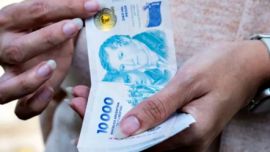During the recent diplomatic crisis between Argentina and Spain, online misinformation about Spanish PM Pedro Sánchez helped to reinforce the discourse of President Javier Milei and his followers while further polarising society, according to experts.
The trigger for the conflict were statements by Spanish Transport minister Óscar Puente, who on May 3 said that Milei had consumed “substances,” to which the Argentine government responded that the Sánchez’s government brought “poverty and death” to its population.
A few days later, during a visit to Spain – during which he attended a rally organised by far-right Spanish party Vox – Milei called Begoña Gómez, Sánchez’s wife, “corrupt” without naming her directly.
The implication, however, was obvious. His words led Spain to withdraw its Ambassador from Buenos Aires almost immediately.
In that context, a screenshot of an alleged post made by Sánchez on the X social media network started spreading. In it, he supposedly asked people to leave his “cherished wife alone”.
According to users in Argentina, Milei made Sánchez “cry so much” that the Spanish leader asked people to stop contributing to the ‘#PedroVigilaATuEsposa’ (“Pedro, watch your wife”) trending topic.
The message resounded with another posted by Milei on May 20, when he wrote on X that he had come back to Buenos Aires “surfing on a wave of Socialist tears.”
The AFP news agency found inconsistencies showing that Sánchez’s alleged post on X never really existed.
It also discovered that two other videos – one of Spaniards apparently congregating “to repudiate Sánchez over the words against Javier” and another in which Milei was “acclaimed by the Spanish people” – had been taken out of their original context.
“Javier Milei’s followers and other sectors find in the criticism of Pedro Sánchez an opportunity to reinforce their own political narrative,” explained Lucía Andaluz, a professor at the Universidad Europea de Madrid and an expert who studies the spread of misinformation.
“This misinformation comes at a time of crisis or high political polarisation, as is happening now, which makes it easier for it to be accepted and spread without previous critical analysis," she said.
On the eve of Milei’s second visit to Spain, on June 21, other images emerged on social networks of posters the Spanish PM had supposedly put up across the country asking for obedience to his government.
The images were from a 2020 street-flyer campaign against Sánchez, but that did not prevent a single Argentine user from accumulating over 1,000 views of his message on X, in which he promoted the tag ‘#PedroSanchezDictador’ (“Pedro Sánchez Dictator”).
Milei himself underlined this position during a speech last Friday, in which he said : “Mr Sánchez obviously (...) does not understand [economics] or likes the State too much to trample over Spaniards.”
The idea that Sánchez has Spaniards lined up against him or is bringing about dictatorial attitudes “may benefit Milei,” stated Andaluz, while “mobilising and consolidating his base of followers”, stated Andaluz.
In the opinion of Carles Pont, an academic with the School of Communication at the Universidad Pompeu Fabra in Barcelona, the success of this type of message is that the more “polarising language is used, the easier it is for citizens to understand what is means.”
“The parties which are the most polarising are the ones that pull it off,” he said.
The use of misinformation to polarise “can work against” the person promoting it, but, for that “there must be a constant struggle by the remaining political groups,” explained Pont.
In the current context, information is “so atomised that citizens are becoming increasingly vulnerable," he highlighted.
– TIMES/AFP



















Comments